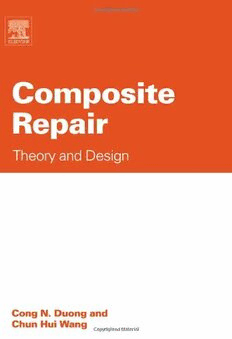Download Composite Repair: Theory and Design PDF Free - Full Version
Download Composite Repair: Theory and Design by Cong N. Duong, Chun Hui Wang in PDF format completely FREE. No registration required, no payment needed. Get instant access to this valuable resource on PDFdrive.to!
About Composite Repair: Theory and Design
Bonded composite repairs are efficient and cost effective means of repairing cracks and corrosion grind-out cavity in metallic structures, and composite structures sustained impact and ballistic damages, especially in aircraft structures. This book grew out of the recent research conducted at the Boeing Company and the Defence Science and Technology Organisation (DSTO, Australia) over the past ten years. Consequently it is predominately a compilation of the work by the authors and their colleagues at these two organizations on the design and analysis of composite repairs. Composite Repair is entirely devoted to the design and analysis of bonded repairs, focusing on the mathematical techniques and analysis approaches that are critical to the successful implementation of bonded repairs. The topics addressed are presentated in a sufficiently self-explanatory manner, and serve as a state-of-the-art reference guide to engineers, scientists, researchers and practitioners interested in the underpinning design methodology and the modelling of composite repairs. * The only book devoted entirely to the design and analysis of bonded repairs* Focusing on mathematical techniques and analytical methodologies that are critical to the successful implementation of bonded repair* A companion reference book to the United Stated Air Force (USAF) bonded repair guidelines (Guidelines for Composite Repair of Metallic Structures-CRMS, AFRL-WP-TR-1998-4113) and the Royal Australian Air Force (RAAF) Design Standard DEF(AUST)995 * Covering a variety of topics and effects: repairs of fatigue and sonic fatigue cracks, and corrosion grind-out cavity, and effects of secondary bending, octagon-shaped patches, thermal residual stresses, patches in proximity, patch tapering edge, etc.
Detailed Information
| Author: | Cong N. Duong, Chun Hui Wang |
|---|---|
| Publication Year: | 2007 |
| ISBN: | 9780080554693 |
| Pages: | 479 |
| Language: | English |
| File Size: | 3.983 |
| Format: | |
| Price: | FREE |
Safe & Secure Download - No registration required
Why Choose PDFdrive for Your Free Composite Repair: Theory and Design Download?
- 100% Free: No hidden fees or subscriptions required for one book every day.
- No Registration: Immediate access is available without creating accounts for one book every day.
- Safe and Secure: Clean downloads without malware or viruses
- Multiple Formats: PDF, MOBI, Mpub,... optimized for all devices
- Educational Resource: Supporting knowledge sharing and learning
Frequently Asked Questions
Is it really free to download Composite Repair: Theory and Design PDF?
Yes, on https://PDFdrive.to you can download Composite Repair: Theory and Design by Cong N. Duong, Chun Hui Wang completely free. We don't require any payment, subscription, or registration to access this PDF file. For 3 books every day.
How can I read Composite Repair: Theory and Design on my mobile device?
After downloading Composite Repair: Theory and Design PDF, you can open it with any PDF reader app on your phone or tablet. We recommend using Adobe Acrobat Reader, Apple Books, or Google Play Books for the best reading experience.
Is this the full version of Composite Repair: Theory and Design?
Yes, this is the complete PDF version of Composite Repair: Theory and Design by Cong N. Duong, Chun Hui Wang. You will be able to read the entire content as in the printed version without missing any pages.
Is it legal to download Composite Repair: Theory and Design PDF for free?
https://PDFdrive.to provides links to free educational resources available online. We do not store any files on our servers. Please be aware of copyright laws in your country before downloading.
The materials shared are intended for research, educational, and personal use in accordance with fair use principles.

